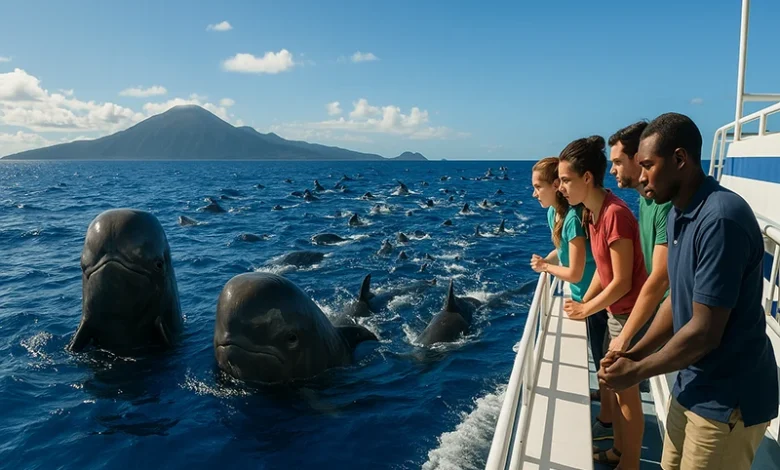Pilot Whales in Dominica

In the deep blue expanse of the Caribbean Sea, where warm currents meet underwater canyons, Pilot Whales reign as one of the most captivating Dominican marine mammals. These graceful, intelligent creatures, belonging to the dolphin family, are spotted frequently and reliably in the waters off the island’s Coastal Communities, especially along the west coast. Unlike seasonal visitors, pilot whales are part of Dominica’s oceanic rhythm year-round, playing a key role in its thriving Marine Biodiversity.
Living Among Marine Giants
Pilot whales (Globicephala macrorhynchus) are sleek, muscular cetaceans, easily identifiable by their dark hue, bulbous heads, and social nature. Adults can reach lengths of up to 20 feet and often travel in tight-knit pods of 15 to 50 individuals. These animals are not just residents; they are indicators of ocean health, directly tied to the strength and complexity of Dominica’s Marine Ecosystems.
Their presence is frequently recorded around marine reserves such as the Soufrière-Scott’s Head Marine Reserve, and offshore from Cabrits National Park, Scotts Head, and Layou. These protected areas are not just vital habitats but also windows into a submerged world full of squid, their favorite prey, and echo the ecological wealth that keeps them here.
A Destination Built Around Marine Encounters
Dominica has earned its unofficial title as the Whale Watching Capital of the Caribbean, and pilot whales are a major reason why. While Sperm Whales are the island’s best-known deep-sea ambassadors, these smaller cousins often steal the show with dynamic surface behaviors like tail-slapping, spy-hopping, and synchronized gliding near tour boats.
These encounters form the lifeblood of Dominica’s flourishing Marine Tourism sector. Visitors depart daily from Coastal Villages such as Soufrière, Scotts Head, Roseau, and Portsmouth, often witnessing these whales while enjoying other marine adventures like Snorkelling, Swimming, Boating, and exploring vibrant Diving Spots.
Strengthening Conservation Through Tourism
Dominica’s whale-focused experiences are tightly aligned with global and local principles of Eco-Tourism and sustainable Tourism. Tours are led by trained local guides who observe strict protocols to reduce stress on wildlife, ensuring that human presence in these waters respects the natural rhythm of the animals.
This approach is actively supported by the Government of Dominica, especially through the Ministry of Tourism, Discover Dominica Authority, Ministry of Environment, Rural Modernisation and Kalinago Upliftment, and the Forestry, Wildlife & Parks Division. These agencies collaborate to maintain not just tourism standards, but the ecological integrity of the Sperm Whale Reserve and surrounding zones.
Facing the Tide of Change
The ongoing effects of Climate Change pose subtle but serious risks to pilot whale populations. Shifts in sea temperature, altered prey distribution, and ocean noise can all disrupt their behaviour. As such, research and protection efforts from international and regional bodies like the Whale and Dolphin Conservation, Caribbean Cetacean Society, and the International Whaling Commission (IWC) are more critical than ever.
Pilot whales in Dominica are not just stars of the sea; they are vital markers of ecosystem stability and natural elegance. By protecting them and the waters they inhabit, Dominica not only safeguards an iconic species but also reinforces the foundations of its Tourism Industry, Dominica Economy, and cultural identity as a guardian of the marine world.




